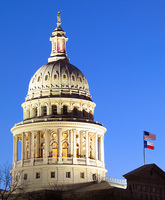Texas Legislature to see several bills addressing illegal immigration
November 18, 2008
Advocates for a crackdown on illegal immigrants, apparently undaunted by their failures in the last Legislature, have filed a slew of bills for the upcoming session that are even stronger in tone and approach.
Written by Karen Brooks, The Dallas Morning News

AUSTIN – Advocates for a crackdown on illegal immigrants, apparently undaunted by their failures in the last Legislature, have filed a slew of bills for the upcoming session that are even stronger in tone and approach.
The proposals go well beyond the usual proposals to require ID to vote or requiring citizenship to get a driver's license.
One would require public schools to check the citizenship of their students. Another would require illegal immigrants to live in self-described "sanctuary cities."
Author Leo Berman, R-Tyler, said he filed it mainly to make a point to cities that describe themselves as "sanctuaries," or havens for illegal immigrants.
"The federal government is requiring us to give free education and health care to illegals," Mr. Berman said. "It's the largest unfunded mandate in the history of our nation."
Two years ago, Republican House leaders decided that the issue was too sticky for the state to deal with and killed most of the bills. One measure, a voter ID bill, died in the Senate and is likely to die there again. Many proposals were deemed unconstitutional by Texas Attorney General Greg Abbott, a Republican.
One bill filed for the 2009 session allows police to check people's immigration status under "reasonable suspicion" that they might be illegal immigrants. Another refuses birth certificates to children born in the U.S. to parents who are here illegally.
On the flip side, a bill by Rep. Roberto Alonzo, D-Dallas, prohibits cities from restricting landlords on who can rent homes from them – a direct criticism of Farmers Branch's efforts to keep illegal immigrants from renting homes there.
Some lawmakers say bills attempting to solve illegal immigration at the state level – no matter how popular – miss the point.
"The reality is that these problems can only be solved in Washington, D.C.," said Rep. Rafael Anchía, D-Dallas.
"Even if every immigration-related bill passed in the Texas House, it would be wholly ineffective at dealing with the larger issue of how we align our immigration policy with the needs of our labor force. And that's what's driving illegal immigration."
On the table
Dozens of immigration- related bills have been filed for the Legislature. Some of them:
Anti-crackdown – A bill by Rep. Roberto Alonzo, D-Dallas, would prohibit cities from regulating who may rent homes there, a direct reaction to attempts by Farmers Branch to crack down on illegal immigrants.
Anti-sanctuary – A bill by Rep. Leo Berman, R-Tyler, would require illegal immigrants to live in "sanctuary cities." He says he filed the bill to make a point: Cities shouldn't declare themselves immigration "sanctuaries."
Taxing remittances – Mr. Berman also filed a bill that would levy an 8 percent fee on all money being sent from Texas to Mexico, Central America and South America. The money would go toward indigent health care.
Human smuggling – A bill by Sen. Leticia Van de Putte, D-San Antonio, would establish an anti-human trafficking task force in the Texas attorney general's office.
Police checks – A bill by Rep. Debbie Riddle, R-Houston, would allow police to check immigration status on "reasonable suspicion" and arrest those with illegal status for violating criminal trespassing laws.
Business sanctions – Another bill by Ms. Riddle would sanction employers who knowingly hire illegal immigrants.
![]()
![]()
Related Stories
![]()
Fair Use Notice
This site contains copyrighted material the use of which has not always been specifically authorized by the copyright owner. We are making such material available in our efforts to advance understanding of environmental, political, human rights, economic, democracy, scientific, and social justice issues, etc. We believe this constitutes a "fair use" of any such copyrighted material as provided for in section 107 of the US Copyright Law. In accordance with Title 17 U.S.C. Section 107, the material on this site is distributed without profit to those who have expressed a prior interest in receiving the included information for research and educational purposes. For more information go to: http://www.law.cornell.edu/uscode/17/107.shtml. If you wish to use copyrighted material from this site for purposes of your own that go beyond "fair use", you must obtain permission from the copyright owner.